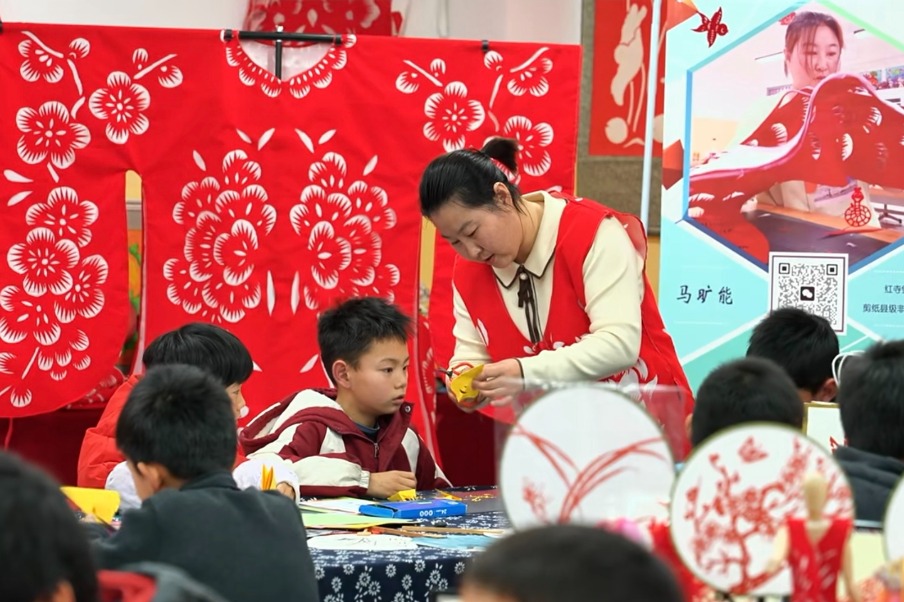Party continues proud tradition of hard work






Members recall ancestors' vital contributions as 102nd anniversary marked
As the Communist Party of China celebrates on Saturday the 102nd anniversary of its founding, descendants of revolutionaries nationwide are hard at work serving the nation and its people.
Many of the descendants are CPC members, and they have benefited from advice and instructions passed on by their families.
Jinzhai county, Anhui province, is one of the birthplaces of the people's armed forces and the Chinese revolution. Officials at the Jinzhai Revolution Museum said that about one-third of the county's 300,000 residents took part in battles, with many of them dying during conflict.
On April 24, 2016, Xi Jinping, general secretary of the CPC Central Committee, visited the museum and a memorial hall for the Red Army.
He laid a wreath at a monument commemorating those who fell during the revolution.
The museum's list of revolutionary martyrs bears 206 names of the local Qi family, while the names of others who sacrificed their lives have been lost.
During this year's Dragon Boat Festival, which fell on June 22, Qi Xiaohu and other members of the Qi clan discussed renovating the family temple in Qidian village, Jinzhai, a main settlement area for the family.
The festival commemorates Qu Yuan (340 BC-278 BC), a patriotic poet from the Chu state during the Warring States Period (475-221 BC). It is also a time for the Qi family to honor its revolutionary and patriotic ancestors.
Cadres needed
The Dabie Mountains Revolutionary Base, located on the borders of Hubei, Henan and Anhui provinces, was one of the most important in the CPC's history. Jinzhai formed a key part of the base.
After graduating, Qi Xiaohu, 32, worked in Shenzhen, Guangdong province, from 2013 to 2020, before returning to Qidian, as his home village needed more cadres. He joined the CPC in 2021 and became deputy secretary of the village's Party branch in February.
"My great grandfather, Qi Xianzhi, was born to a wealthy family which managed iron plants, hospitals and shops in its hometown and in Wuhan, Hubei province," said Qi Xiaohu, who learned the family's history from his ancestors.
"Qi Xianzhi learned communist ideals and developed socialist convictions when he was at school in Wuhan."
With an introduction from Dong Biwu, one of the CPC's founders, Qi Xianzhi joined the Party in 1926 in Wuhan.
The years 1924 to 1927 marked the first period of cooperation between the Kuomintang, or the Chinese Nationalist Party, and the CPC.
After this cooperation was violated by the KMT, Qi Xianzhi secretly bought guns and ammunition, and transported them to Qidian.
In 1929, when the CPC led a successful uprising around Banzhuyuan township, which governs Qidian, Qi Xianzhi donated the weapons to the newly founded 32nd Division of the Eleventh Red Army.
"He encouraged many members of the Qi family to join the Red Army to resist the KMT, but was killed by the enemy in 1931, when he was 39," Qi Xiaohu said, adding, "Eight of the 10 cousins from my great grandfather's generation died for the revolution."
While Qidian is home to many members of the Qi family, Qi Zhongcun, 73, has always lived in his ancestral village of Xiaohe, which once boasted the house owned by his grandfather, Qi Dewei. However, the property was burned down by Kuomintang forces in 1928.
Qi Dewei was born in 1909, when the family site was owned by Henan province.
He joined the CPC in 1924 at a farmers' school in Shangcheng county, Henan.
In early 1927, he attended a military school in Wuhan and received guidance from Mao Zedong.
Qi Dewei took part in leading an uprising in and around Banzhuyuan, before becoming a deputy chief of the 32nd Division of the Eleventh Red Army.
He was then sent to the Central Revolutionary Base on the borders of Jiangxi, Fujian and Guangdong provinces, but died in Jiangxi in 1931, when he was 22.
Qi Zhongcun, who joined the CPC 46 years ago, said, "When my father was just 3 months old, my grandfather returned home and named him Guo'an, which literally means 'national peace'."
Wartime memories
At a memorial hall to the heroic Yimeng Mothers in Yinan county, Linyi, Shandong province, a group of primary school students recently listened to stories told by Yu Aimei, 71, granddaughter of one of the mothers.
The Yimeng Mothers voluntarily took care of soldiers and their children during wartime. They also cooked, made shoes by hand, washed clothes for the troops, and helped provide transportation and ammunition.
Located in the Yimeng Mountains, Linyi was home to a major revolutionary base during China's struggle for liberation in the 1930s and '40s.
The Yimeng Mothers helped nurture the Yimeng Spirit, which embodies the perseverance and resilience of the Chinese people in the face of hardship.
One of the mothers, Wang Huanyu, was born in 1888. She joined the CPC in 1938, and founded a wartime nursery for soldiers' children in 1939, when the CPC-led Eighth Route Army settled in her hometown, using it as a revolutionary base to resist the Japanese invasion.
She felt sorry for the children brought to the nursery by their parents amid the conflict.
Yu said, "As a way to help, Wang encouraged villagers to take care of the children."
Wang asked her daughter-in-law to feed her own breast milk to children of soldiers who sacrificed their lives. There was not enough milk for a number of children, and Wang's grandchildren had to be fed coarse grain.
During wartime, the nursery was home to more than 80 children, with the youngest 3 days old and the eldest around 7 or 8, county government data show.
Yu's stories moved several students to tears.
"As a descendant of the Yimeng Mothers, I have the responsibility to pass down their stories to encourage more people to cherish their lives and work hard for better lives," Yu said.
After retiring from teaching, Yu spearheaded the launch of an association to inherit and promote the Yimeng Spirit.
"The Yimeng Spirit, which needs to be passed down from generation to generation, will motivate young people to work hard in the new era," Yu said.
In Yishui county, which neighbors Yinan, Wang Chengcheng, 30, has been motivated by the Yimeng Spirit to lead villagers in building a better life and prosperous future.
The village of Xiqiangyu was once isolated in the mountains due to a lack of development, but the situation changed in 2019, when Wang arrived to work as its Party secretary.
Despite facing the challenging task of improving the village's infrastructure and economy, Wang was determined to bring change to the area.
Just two days after she arrived, her leadership was put to the test when Typhoon Lekima hit the village.
Wang worked tirelessly to evacuate more than 100 residents living in the mountains. She was commended by the villagers for her dedication, winning their trust as a result.
Focusing on the promotion of rural tourism, Wang worked to improve the village's infrastructure. Roads were widened and new facilities built to attract visitors.
She encouraged residents to open their own homestays and restaurants, and also established a professional cooperative to attract funding and investment.
Thanks to Wang's hard work, Xiqiangyu has become a popular tourist destination, with visitors enjoying its mountain scenery and experiencing the Yimeng Spirit.
Wang said: "I have been touched by the numerous stories I have heard about the Yimeng Mothers. I feel honored to do something for the villagers and help them live a better life."
Numerous battles
CPC member Ren Yanfa and one of his two brothers joined the Red Army in Wupu county, Shaanxi province, after the local Party organization was founded in 1926.
After surviving many battles, Ren named his three grandsons Aiguo, Aijun and Aimin, which translate as "loving the country", "loving the army" and "loving the people".
One of the grandsons, Ren Aiguo, the son of an army engineer who moved to Yinchuan, Ningxia Hui autonomous region, in the late 1980s, said, "Our grandfather gave instructions for our names, which symbolize family belief."
After Ren Aimin arrived in Yinchuan when he was 15, one of his uncles gave him about 1,000 yuan.
"I spent 300 yuan on buying a tricycle, which I used to sell fruit. Initially, I earned less than 10 yuan a day, but my goal was to earn 20 or 30 yuan each day," he said.
Before Spring Festival in 1996, a neighbor in the community returned from a business trip with several boxes of pitaya fruit and mangoes, and gave them to Ren Aimin to sell.
"I had never seen such fruit before, and wondered if I could make a profit, but I quickly earned more than 400 yuan," Ren Aimin said.
He then borrowed from friends to set up a fruit import business — first in Xi'an, Shaanxi, and later in Guangzhou, Guangdong. In just a few years, Ren Aimin became a successful businessman.
In 2005, he established his own wholesale and retail fruit business in Yinchuan, which saw sales revenue of more than 100 million yuan in its first year.
The following year, Ren Aimin invested 38 million yuan on building a modernized agricultural industrial park, helping young farmers learn new technologies and business concepts.
He then founded a specialized fruit plantation cooperative, attracting members from 232 households.
Ren Aiguo, who started work as a tailor's apprentice, later became the owner of a major clothing brand in Ningxia and elsewhere.
During the national poverty alleviation campaign, his clothing plant lifted more than 300 people out of poverty, while Ren Aimin's fruit business has helped over 4,000 rural households achieve prosperity.
Ren Aiguo named his daughter Ranran, which translates as "gradually" and is often used to describe the sun rising.
"In the past century, my family has taken part in the revolution, witnessed the country's rapid development, and subsequently benefited greatly from development. Our destiny is always strongly connected to that of the nation," he said.
Zhang Jing in Lu'an, Anhui, contributed to this story.
- Former senior official of Ningxia sentenced to death
- Development program narrows urban-rural gap in Guangdong
- Wuxi Winter Bazaar creates cross-cultural gathering
- Expressway service area featuring a natural hot spring to open soon in Guangdong
- Former Ningxia political advisor sentenced to death for bribery
- Former senior official of Jiangxi expelled from CPC

































